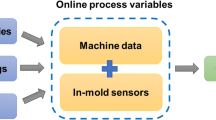Abstract
This paper aims to provide an approach in the optimization of the functional requirements and design parameters of a production process based on uncertainty. Such approach is developed considering that the uncertainty arises from a manifestation of information deficiency. In this case, the uncertainty is characterized by the inability of the production system to completely satisfy the corresponding functional requirements reflected in the product. All production processes generate information, either directly or indirectly, from its operations; the characteristics of this information can be viewed in terms of uncertainty to analyze its behavior with respect to the variation of the functional requirements and the process parameters. The uncertainty approach is defined considering that the behavior of the functional requirements and process parameters follow a normal distribution; from this distribution, the uncertainty is obtained via the continuous form of the Shannon entropy. Regression modeling is used as a tool to relate the functional requirements of the process to their corresponding parameters, such that the multiple regression model can be established and extended as a time function to define a model to deal with uncertainty. In addition, control parameters are obtained by using step-wise-regression. This modeling is presented for assessment, optimization, and control purposes of an extrusion molding process.
Similar content being viewed by others
References
Anderson TW, Darling DA (1954) A test of goodness of fit. J Amer Stat Assoc 49(268):765–769. doi:10.1080/01621459.1954.10501232
Babic B (1999) Axiomatic design of flexible manufacturing systems. Int J Prod Res 37(5):1159–1173. doi:10.1080/002075499191454
Cheng Q, Xiao C, Zhang G, Gu P, Cai L (2014) An analytical robust design optimization methodology based on axiomatic design principles. Qual Reliab Eng Int 30(7):1059–1073. doi:10.1002/qre.1534
Cochran DS, Reynal VA (1996) Axiomatic design of manufacturing systems. Technical Report RP96-05-14, The lean Aircraft initiative
Cover TM, Thomas JA (2005) Elements of information theory. Wiley. doi:10.1002/047174882x
Crosby PB (1980) Quality is free: The art of making quality certain. Signet
Forbes JF, Marlin TE (1996) Design cost: a systematic approach to technology selection for model-based real-time optimization systems. Comput Chem Eng 20(6):717–734. doi:10.1016/0098-1354(95)00205-7
Hazelrigg GA (1998) A framework for decision-based engineering design. J Mech Des 120(4):653–658. doi:10.1115/1.2829328
Hazelrigg GA (2003) Validation of engineering design alternative selection methods. Eng Optim 35(2):103–120. doi:10.1080/0305215031000097059
Hegyi G, Garamszegi LZ (2011) Using information theory as a substitute for stepwise regression in ecology and behavior. Behav Ecol Sociobiol 65(1):69–76. doi:10.1007/s00265-010-1036-7
Jefferson TG, Ratchev S, Crossley R (2014) Axiomatic design of a reconfigurable assembly system for primary wing structures. SAE Int J Aerosp 7(2):229–240. doi:10.4271/2014-01-2249
Jefferson TG, Benardos P, Ratchev S (2016) Reconfigurable assembly system design methodology: a wing assembly case study. SAE Int J Mater Manuf 9(1):31–48. doi:10.4271/2015-01-2594
Klein V, Batterson JG, Murphy PC (1981) Determination of airplane model structure from flight data by using modified stepwise regression. Technical Report NASA-TP-1916
Lee G, Badrul O (2014a) Optimization for sustainable manufacturing based on axiomatic design principles: a case study of machining processes. Adv Prod Eng Manag 31(1). doi:10.14743/apem2014.1.174
Lee GB, Badrul O (2014b) Integrating axiomatic design principles into sustainable product development. Int J Precis Eng Manuf-Green Technol 1(2):107–117. doi:10.1007/s40684-014-0015-2
Li H, Azarm S (2000) Product design selection under uncertainty and with competitive advantage. J Mech Des 122(4):411–418. doi:10.1115/1.1311788
Mundry R, Nunn CL (2009) Stepwise model fitting and statistical inference: turning noise into signal pollution. Am Natur 173(1):119–123. doi:10.1086/593303
Rencher AC, Schaalje GB (2008) Linear models in statistics. Wiley
Renzi C, Leali F, Pellicciari M, Andrisano A, Berselli G (2015) Selecting alternatives in the conceptual design phase: an application of fuzzy-ahp and pughs controlled convergence. Int J Interact Des Manuf (IJIDeM) 9 (1):1–17. doi:10.1007/s12008-013-0187-y
Rodríguez-Picón LA (2016) Optimization of production parameters based on a two-stage information content approacha case study. The International Journal of Advanced Manufacturing Technology pp 1–9, 10.1007/s00170-016-8943-3
Shannon CE (1948) A mathematical theory of communication. Bell Syst Tech J 27:379–423,623–656. doi:10.1002/j.1538-7305.1948.tb00917.x
Suh NP (1990) The principles of design, vol 990. Oxford University Press, New York
Suh NP (2005) Complexity: theory and applications. Oxford University Press, New York
Thielman J, Ge P (2006) Applying axiomatic design theory to the evaluation and optimization of large-scale engineering systems. J Eng Des 17(1):1–16. doi:10.1080/09544820500287722
Weisberg S (2005) Applied linear regression, vol 528. Wiley. doi:10.1002/0471704091
Author information
Authors and Affiliations
Corresponding author
Rights and permissions
About this article
Cite this article
Rodríguez-Picón, L.A. An uncertainty approach for optimization of production parameters—a case study in an extrusion molding process. Int J Adv Manuf Technol 90, 167–176 (2017). https://doi.org/10.1007/s00170-016-9358-x
Received:
Accepted:
Published:
Issue Date:
DOI: https://doi.org/10.1007/s00170-016-9358-x




